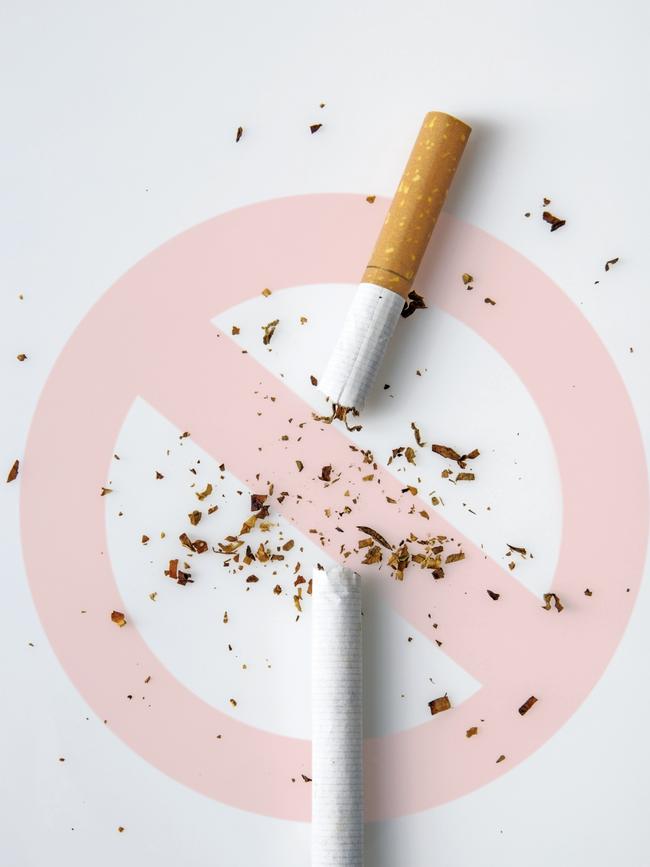Quit smoking: Buddy-up to kick the nicotine habit for good
Friday is World No-Tobacco Day — if you’re thinking of quitting for your heart’s sake, finding a friend to do it with you could be the key to success.
Like so many smokers, Lizzie Newman had her first cigarette when she was a teenager.
“I had asthma and it had always been drummed into me that smoking kills,” the now-46-year-old says.
Despite knowing the risks, the temptation was too much for her.
“My friends and boyfriend smoked, and eventually I started smoking, too. Everyone I knew did it.”
Social smoking is a well-known phenomenon.
“If your friends smoke, you’re more likely to smoke, too,” confirms psychologist Donita Baird, from the Australian Centre for Heart Health.
“Most people start smoking in their youth and when young people smoke, it’s usually a social activity.”

According to the Australian Bureau of Statistics’ National Health Survey, 13.8 per cent of Australians aged 18 and over smoke daily. This is a marked improvement on 1995 figures when 23.8 per cent of Aussie adults smoked daily.
MORE FROM BODY+SOUL:
ACTIVE AND HEALTHY FAMILY HOLIDAY ESCAPES
MAKING INTROVERT-EXTROVERT RELATIONSHIPS WORK
While this is certainly a step in the right direction, currently, the average daily smoker puffs on more than 12 cigarettes a day and there’s clearly still a way to go.
So if social smoking and peer pressure is still a thing, it’s worth noting that as well as encouraging you to start smoking, the people around you can also inspire you to stop smoking.
“Often people are fearful that they’ll lose friends if they give up,” Dr Baird explains.
“But those who quit smoking can actually gain friends and inspire others to quit.”

A groundbreaking study of over 12,000 people by social scientists Nicholas Christakis and James Fowler identified a phenomenon dubbed the ‘quitting contagion’.
It found that friends, colleagues and relatives tend to quit simultaneously and “like a flock of birds changing direction at the same time”, it has a knock-on effect on the wider social group.
“We found that if one person quits smoking, it affects not just that person’s friends, but also friends of friends of friends,” says Christakis.
“Cultural shifts trigger a herd effect, which means that if you give up smoking with another person, your chance of giving up goes up — and that if you make a positive change in your life, you can potentially affect dozens of others, too.”
THE BUDDY PRINCIPLE
Kate Reakes, manager of prevention at the Cancer Institute NSW, agrees that your social group can have a big impact on your success.
“Former smokers often report that receiving support from close family and friends was an important part of them successfully quitting,” she says.
“The smoking status of a person’s partner can also substantially influence likelihood of quitting, with smokers tending to be less supportive than non-smokers of their partner’s attempt to quit.”

So if you’re both smokers, persuading your partner to buddy-up with you in quitting could be the difference between success and failure.
Over the years, Lizzie had tried to kick the habit, without much success.
“I’d be wearing a nicotine patch and smoking at the same time,” she admits.
“I read Allen Carr’s Easy Way to Stop Smoking, too. It worked for a while, but I wasn’t in the right mindset to quit for good.”
The turning point for Lizzie came when her friends started giving up.
“As they got older and started having children, they gradually managed to quit,” she says, adding that seeing them all doing this “amazing thing” made her want to do it, too.
“My friend Fiona and I decided to go for it together. As so many in our circle knew what we were going through, they were really supportive.
“Fiona and I would call each other if we had cravings and the others would text us to check how we were doing. We even planned trips away using the money we’d saved.
“I did cheat occasionally in the beginning, but never around Fiona. And when she was successful, it showed me I could be, too. Having someone else to quit with and support me through it really made all the difference.”
TALK IT OVER
If you’re planning on finding a quit buddy, Dr Baird does have some words of caution.
“Keep in mind that everyone is different. You may experience more nicotine-withdrawal symptoms than your buddy, or cope with stress differently, so I recommend having personalised plans,” she advises.
“It’s also important to talk about what happens if one person starts smoking again. If you don’t, they may feel guilty if the other person also starts smoking again later. Or the person who stopped may start experiencing cravings again because the other person has started smoking. All these things can put a big strain on a relationship.”
For Lizzie, getting a quit buddy was the right quitting strategy for her.
“I’m so glad I gave up,” she says.
“I’ve got better lung capacity, and my sleep and snoring — which used to be like an orchestra — have improved, too. It’s been more than a year now and this time feels different — I know I’ve quit for good.”

SMOKING AND YOUR HEART
Smoking reduces the amount of oxygen in your blood and damages blood vessels. It contributes to the narrowing and clogging of the arteries, called atherosclerosis, as well as increasing the stiffness of arteries.
All this means that a smoker is twice as likely to have a heart attack and 20 times more likely to develop angina.
The good news is that your risk of a heart attack or stroke is halved just one year after quitting, and your heart health will eventually return to that of someone who has never smoked within five to 15 years.
HOW TO HELP IF YOU DON’T SMOKE
If you’re a non-smoker, here’s how you can support a friend or relative who’s trying to quit:
1. Take their mind off it
“Offer to do fun things together that don’t involve smoking,” says Dr Baird.
“For example, rather than going to a pub or party, go to a restaurant or a movie.”
2. Join in where you can
Exercise is a mood-boosting distraction from smoking.
“If your friend has decided to take up exercise and needs encouragement, offer to get involved,” Dr Baird advises.
3. Point them towards extra support
Quit.org.au and Icanquit.com.au offer resources and support to help smokers kick the habit. Find a qualified psychologist at psychology.org.au, or send your friend to the app store where programs such as Kwit and My QuitBuddy may also help.


